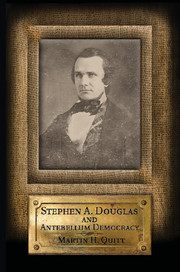Book contents
- Frontmatter
- Contents
- Acknowledgments
- Abbreviations
- Introduction
- 1 Adolescence in Vermont
- 2 Schooling, Learning, and Passing the Bar
- 3 Family Influences, Stress, and Bonds
- 4 Democratic Prodigy in Illinois
- 5 Constitutionalism, Part I
- 6 Constitutionalism, Part II
- 7 The 1860 Campaign and the Code Against Campaigning
- 8 In Lincoln’s Shadow
- 9 Douglas’s Mississippi Slaves
- Appendix Douglas’s Campaign Itinerary, 1860: June 23 to November 6
- Index
- References
Introduction
Published online by Cambridge University Press: 05 October 2012
- Frontmatter
- Contents
- Acknowledgments
- Abbreviations
- Introduction
- 1 Adolescence in Vermont
- 2 Schooling, Learning, and Passing the Bar
- 3 Family Influences, Stress, and Bonds
- 4 Democratic Prodigy in Illinois
- 5 Constitutionalism, Part I
- 6 Constitutionalism, Part II
- 7 The 1860 Campaign and the Code Against Campaigning
- 8 In Lincoln’s Shadow
- 9 Douglas’s Mississippi Slaves
- Appendix Douglas’s Campaign Itinerary, 1860: June 23 to November 6
- Index
- References
Summary
Why did Stephen Douglas become a Democrat, not a Whig? We ought to know, because he was an architect of the antebellum party system; he forged an uncommon bond with voters; and he embraced and reformulated the principles of the Democratic Party. After his arrival in Illinois at the age of twenty, he became an essential builder of the Democratic Party in the 1830s, an influential voice for it the party in Congress during the 1840s and 1850s, and its standard bearer in 1860, when, accompanied by his wife, he was the first presidential candidate in American history to campaign across the country. While his three presidential rivals complied with the code against campaigning, he openly explained and defended the Democratic platform that he had shaped. Historians often focus less on his ideas than on his motives, but both merit attention, because the principles his party stood for mattered greatly to him.
Douglas believed that his political allegiance was “fixed” forever at the age of fifteen, during the presidential contest of 1828, when he and fellow apprentices supported Andrew Jackson against their employer’s preference, John Quincy Adams. Yet the full story of his adolescence makes it difficult to imagine his ever joining the Whigs, whom he associated with the discredited Federalists. His crisis-laden journey from youth in Vermont to manhood in Illinois bent him toward the Democrats’ vision of the Republic as an expanding union comprising disparate but equal states and territories. Following his trials with family, romance, school, and illness between his fourteenth and twenty-first birthdays enables us to understand why he believed that every place did not suit every individual, that America should be large and diverse enough to enable every person to find the particular locale in which he or she could thrive. The emotionally intense years of his adolescence, which he revisited consciously time and again as an adult, provided the psychological foundation for his lifelong political disposition.
- Type
- Chapter
- Information
- Stephen A. Douglas and Antebellum Democracy , pp. 1 - 12Publisher: Cambridge University PressPrint publication year: 2012



